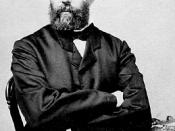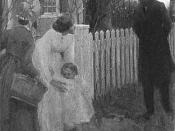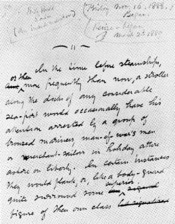Nathaniel Hawthorne and Herman Melville are similar because they both have pessimistic views of humanity. Billy Budd is a story about a young sailor named Billy, who doesn't fit the normal sailor stereotype. Officer Claggart continually picks him on because of his innocence and ignorance. To make matters worse, one of the corporals tells Claggart that Billy Budd was ridiculing him. Claggart takes offense at this lie and begins to watch Billy vigilantly. When Billy finds out from a veteran sailor that Claggart doesn't like him, he doesn't believe it. "The Minister's Black Veil" is a story about a clergyman who was extremely eccentric. He wore a black veil over his face to show that everyone was hiding some kind of sin. Hawthorne suggests that man is essentially good, but societies tendency to judge makes man's inner good inaccessible. Melville is more pessimistic though, because through his character, Claggart, he also suggests that jealously is the source of much of the evil that occurs.
Hawthorne believes that humans are very judgmental of others and shows this in "The Minister's Black Veil". One of the reasons behind the veil might be secret sin. Father Hooper might have committed a very bad sin, which he does not want to unveil to anyone. Instead of not telling anyone the sin he shows it clearly on his face with the aid of a black veil. "When Mr. Hooper came, the first thing that their eyes rested on was the same horrible black veil, which had added deeper gloom to the funeral, and could portend nothing but evil to the wedding" (720). The people of the town were afraid of the black veil, because it was honest, and they didn't think everyone needed to know they 'sinned,' no matter how small...


